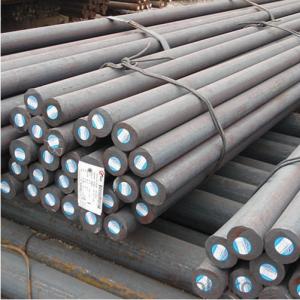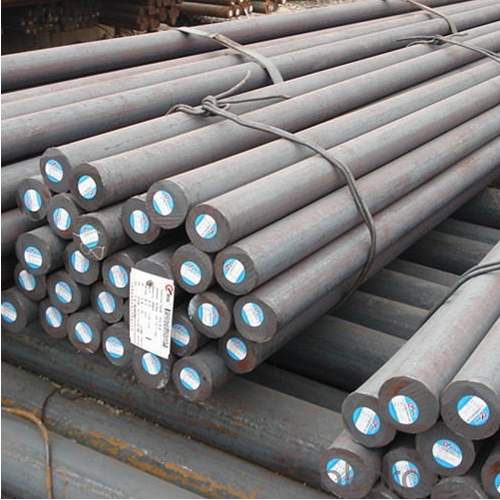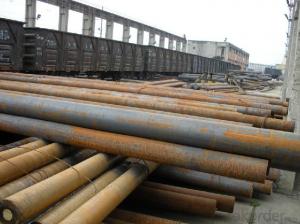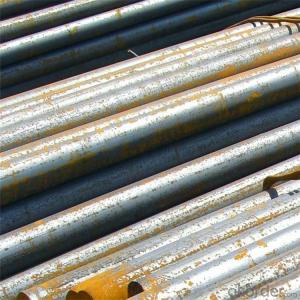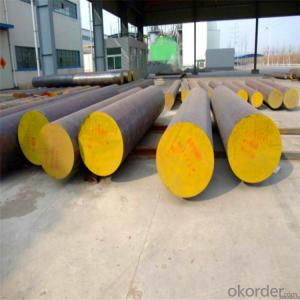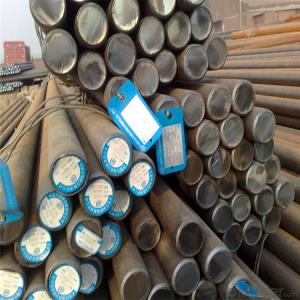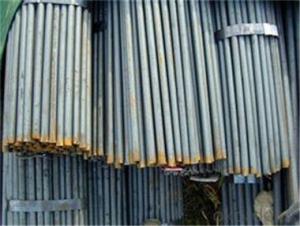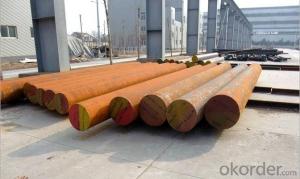C45 Steel Round Bar for Constructure Material
- Loading Port:
- Shanghai
- Payment Terms:
- TT or LC
- Min Order Qty:
- 25 m.t.
- Supply Capability:
- 500000 m.t./month
OKorder Service Pledge
OKorder Financial Service
You Might Also Like
Specification
C45 Steel Round Bar for Constructure Material
Product Description:
1. Sizes: Diameter: 16mm-300mm; Length: 6m, 9m, 12m
2. Grade: 45#, astm1045, S45C,C45
3. Invoicing on theoretical weight or actual weight as customer’s request
4. Shape: Round bar, solid bar of steel with circular section
5. Technique: Hot rolled, forged, cold rolled
Chemical Composition:
C | Si | Mn | P | S | Ni | Cr | Cu |
0.42-0.50 | 0.17-0.37 | 0.50-0.80 | ≤0.035 | ≤0.035 | ≤0.30 | ≤0.25 | ≤0.25 |
Packing and Delivery:
Packing in bundle with steel strips and shipped by break bulk vessel or container (depend on target market and different ports)
Delivery Detail: Approx.45 days
Usage and Applications
1. Steel round bar is used in a large number of architectural and engineering structures. Or it can be used in construction of plants for the production of steel house frames, high-voltage transmission towers, bridges, vehicles, boilers, containers, ships, etc.
2. And we can use this kind of product on the performance of the mechanical parts if the demand is not very high.
3. Some especial material steel round bar can be used for main shaft of steamer, hummer shank, with big section and supper force.
Specification:
OD | Length | Material | Standard | Technique |
16-260mm | 6-12m or aques per request | 20# | GB ASTM DIN | Hot rolled |
16-350mm | 45# | |||
200-500mm | 45# | Forged | ||
20-250mm | 20Cr,40Cr,20-42CrMo | Hot rolled | ||
50-300mm | GCr15 |
Product show of C45 Steel
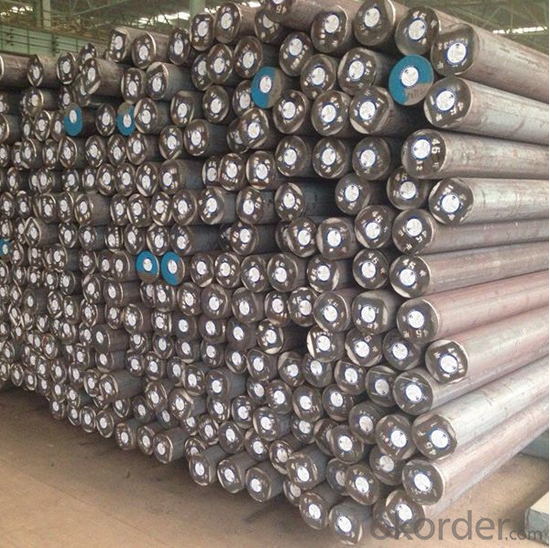
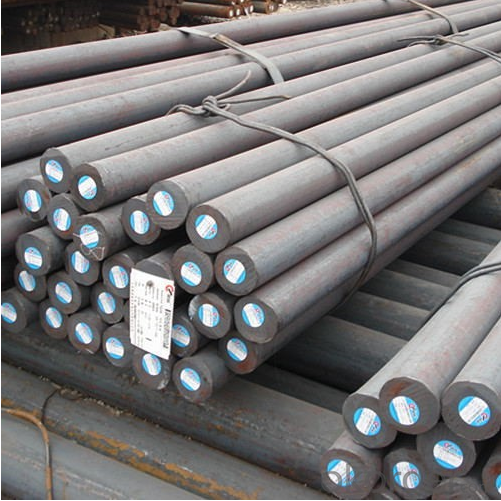
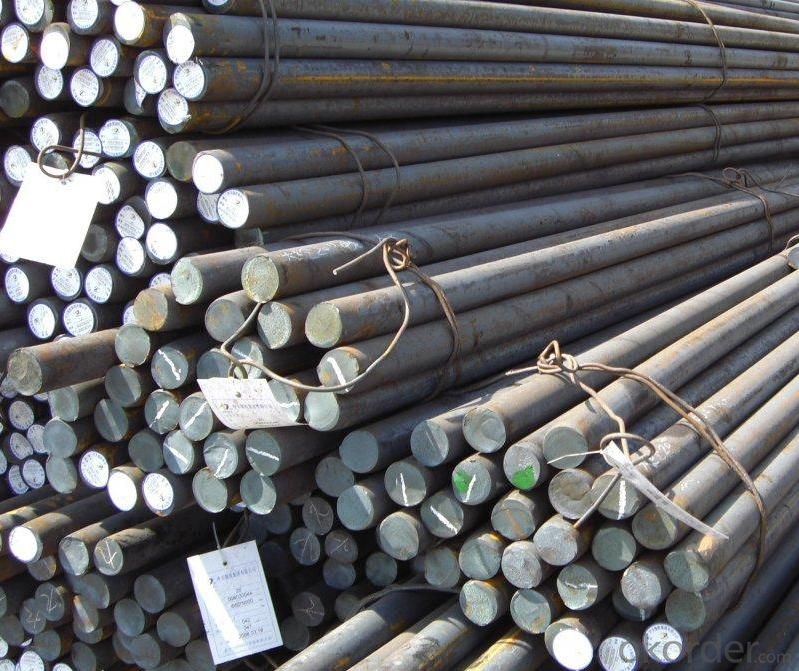
- Q: How does special steel contribute to improving product efficiency?
- Special steel contributes to improving product efficiency in several ways. Firstly, special steel has excellent strength and durability properties, allowing products to withstand higher stress levels and operate reliably under demanding conditions. This enables manufacturers to design more efficient and compact products, reducing weight and space requirements. Secondly, special steel can have superior corrosion resistance, ensuring longer product lifespan and reducing maintenance needs. Additionally, special steel can offer enhanced heat resistance and conductivity, allowing for more efficient energy transfer and utilization in various applications. Overall, the use of special steel enables the production of more efficient and high-performing products across different industries.
- Q: How does special steel contribute to the renewable energy equipment industry?
- The renewable energy equipment industry heavily relies on special steel, as it offers the strength, durability, and corrosion resistance needed for different components. Wind turbines, for instance, make extensive use of special steel alloys in their towers, blades, and gearboxes due to their high tensile strength and resistance to fatigue. This allows wind turbines to endure harsh environmental conditions and operate efficiently over extended periods. Additionally, special steel is widely employed in the manufacturing of solar power equipment. Stainless steel is often used to frame solar panels, providing excellent corrosion resistance and structural stability, ensuring their longevity and performance in outdoor settings. Moreover, special steel alloys are utilized in the production of solar trackers, enabling solar panels to track the sun's movement throughout the day and optimize energy generation. In the hydroelectric power industry, special steel is crucial in constructing turbine components such as blades, shafts, and casings. These components face high pressures, water flow, and abrasive wear, making the use of special steel essential for reliability and longevity. Furthermore, special steel is also integral in the production of energy storage systems like batteries and fuel cells. These technologies require materials with high conductivity, corrosion resistance, and mechanical strength, making special steel alloys ideal for their construction. Overall, special steel significantly contributes to the renewable energy equipment industry by providing the necessary strength, durability, and corrosion resistance for various components. Its utilization in wind turbines, solar panels, hydroelectric power systems, and energy storage technologies ensures the reliability and longevity of these equipment, ultimately promoting the growth and sustainability of the renewable energy sector.
- Q: What are the common challenges in heat treating titanium alloys?
- Heat treating titanium alloys can present several common challenges. One of the main challenges is the high reactivity of titanium with oxygen, nitrogen, and hydrogen at elevated temperatures. This reactivity can lead to surface contamination and the formation of undesirable oxides, nitrides, or hydrides, which can affect the mechanical properties of the alloy. Another challenge is the formation of alpha-case, a thick layer of alpha-phase titanium on the surface of the alloy during heat treatment. Alpha-case is brittle and can significantly reduce the fatigue strength and ductility of the material. Therefore, minimizing or eliminating the formation of alpha-case is crucial in heat treating titanium alloys. Furthermore, titanium alloys have a narrow temperature range for effective heat treatment. If the temperature is too low, it may not achieve the desired microstructure and mechanical properties. On the other hand, if the temperature is too high, it can lead to grain growth, which can reduce the strength and toughness of the alloy. Additionally, the heat treatment of titanium alloys often requires precise control of the heating and cooling rates to achieve the desired microstructure and properties. Rapid or uneven cooling can result in non-uniform microstructures, residual stresses, or distortion of the part. Finally, the cost of heat treating titanium alloys can be a challenge. Titanium alloys have a high affinity for oxygen, which necessitates the use of specialized equipment, such as vacuum furnaces or controlled atmosphere furnaces, to maintain a low oxygen environment. These specialized heat treatment processes can be expensive and require careful handling and maintenance to ensure the desired results. In conclusion, the common challenges in heat treating titanium alloys include managing reactivity with oxygen, nitrogen, and hydrogen, minimizing alpha-case formation, achieving the correct temperature range, controlling heating and cooling rates, and dealing with the cost of specialized equipment and processes. Overcoming these challenges is essential to obtain high-quality titanium alloy components with desired properties.
- Q: How is weathering steel used in outdoor structures?
- Weathering steel, also known as Corten steel, is commonly used in outdoor structures due to its unique properties. It forms a protective rust-like layer on its surface, which not only enhances its aesthetic appeal but also acts as a barrier against further corrosion. This makes weathering steel a popular choice for outdoor sculptures, bridges, building facades, and other structures that are exposed to the elements. Additionally, its durability and low maintenance requirements make it a cost-effective and sustainable option for long-lasting outdoor constructions.
- Q: How is special steel used in the marine supply chain?
- Special steel is widely used in the marine supply chain for various applications. It is commonly used in the construction of ships and offshore structures due to its high strength, corrosion resistance, and durability. Special steel is used for manufacturing ship hulls, propeller shafts, engine components, and other critical parts that require exceptional strength and resistance to harsh marine environments. Additionally, special steel is utilized in the production of marine equipment such as anchors, chains, wire ropes, and connectors, ensuring their reliability and safety in maritime operations.
- Q: What are the requirements for special steel used in industrial equipment manufacturing?
- To ensure the suitability of special steel for use in demanding applications in industrial equipment manufacturing, certain requirements must be met. These requirements include: 1. Exceptional strength: Given the heavy loads that industrial equipment often encounters, special steel must possess superior strength properties to withstand these forces. It should exhibit high levels of yield strength, tensile strength, and hardness to prevent deformation or failure. 2. Resistance to corrosion: Industrial environments are frequently subject to corrosion caused by exposure to chemicals, moisture, or extreme temperature fluctuations. Therefore, special steel used in such applications should possess excellent corrosion resistance to prevent degradation and ensure long-term performance. 3. High resistance to wear: The friction, abrasion, and impact experienced by industrial equipment often lead to significant wear. Consequently, special steel needs to exhibit exceptional wear resistance to maintain its integrity and prevent premature failure. 4. Toughness and resistance to impact: Industrial settings can subject equipment to sudden shocks, impacts, or vibrations. To withstand such events, special steel should demonstrate good toughness and resistance to impact, absorbing energy and resisting fracture or cracking. 5. Ability to withstand high temperatures: Certain industrial processes expose equipment to high temperatures or rapid temperature changes. Special steel must exhibit excellent heat resistance, retaining its strength, hardness, and other mechanical properties even at elevated temperatures. 6. Ease of machining: Special steel used in industrial equipment manufacturing should be easy to machine, facilitating the fabrication process. It should allow for simple cutting, drilling, welding, and other machining operations without excessive tool wear or damage to the material. 7. Dimensional stability: Equipment components must maintain their shape and dimensions under various operating conditions. Special steel needs to exhibit dimensional stability to prevent warping, distortion, or dimensional changes that could impact the performance or assembly of the equipment. By meeting these requirements, special steel used in industrial equipment manufacturing can endure harsh conditions, deliver reliable performance, and have a long service life. Ultimately, this contributes to the overall efficiency and productivity of industrial processes.
- Q: What are the applications of special steel in the renewable energy sector?
- The development and advancement of various renewable energy technologies heavily rely on special steel. Specifically, in the renewable energy sector, special steel is crucial for the manufacturing of wind turbines. Wind turbine components, including towers, generator frames, rotor hubs, and bearings, require high-strength and corrosion-resistant steel to withstand harsh operating conditions such as strong winds and exposure to moisture. The use of special steel ensures the longevity and reliability of wind turbines, thus promoting the growth of wind energy. Furthermore, special steel is extensively employed in the construction of solar power plants. Steel with excellent structural integrity, durability, and resistance to environmental degradation is necessary for solar panel frames, mounting structures, and support systems. Special steel provides these desired qualities, ensuring the stability and optimal performance of solar installations. In addition, special steel finds applications in the production of components for hydroelectric power plants. The construction of turbines, penstocks, and other hydraulic equipment requires steel with high tensile strength and resistance to corrosion caused by water and sediments. Special steel alloys possess these characteristics, making them ideal for hydroelectric power generation. Moreover, special steel is utilized in the manufacture of energy storage systems, such as batteries and fuel cells. These systems demand steel with outstanding conductivity, corrosion resistance, and mechanical strength to ensure efficient and reliable energy storage. Special steel alloys can meet these requirements, making them suitable for use in renewable energy storage technologies. In conclusion, special steel plays a vital role in the renewable energy sector by providing the necessary properties for the manufacturing of wind turbines, solar power plants, hydroelectric power plants, and energy storage systems. Its high-strength, corrosion-resistant, and durable characteristics enable the development of efficient and reliable renewable energy technologies, thereby contributing to the sustainable energy transition.
- Q: What are the different methods of analyzing the microstructure of special steel?
- There are several methods used to analyze the microstructure of special steel, including optical microscopy, scanning electron microscopy (SEM), transmission electron microscopy (TEM), X-ray diffraction (XRD), and spectroscopy. Optical microscopy allows for the observation of the steel's microstructure at low magnifications, while SEM provides higher resolution images and can also be used for elemental analysis. TEM is used to study the atomic structure and defects within the steel's microstructure. XRD is employed to determine the crystallographic phases present in the steel, while spectroscopy techniques such as energy-dispersive X-ray spectroscopy (EDS) and X-ray photoelectron spectroscopy (XPS) provide chemical composition information.
- Q: How does special steel contribute to the shipbuilding industry?
- Special steel plays a crucial role in the shipbuilding industry by providing enhanced strength, durability, and corrosion resistance to ships. It allows for the construction of lighter and more fuel-efficient vessels without compromising on structural integrity. Additionally, special steel enables the development of advanced ship components, such as propellers, hulls, and offshore structures, which can withstand harsh marine environments and ensure safer and more reliable operations at sea.
- Q: How does special steel contribute to the robotics industry?
- Special steel plays a crucial role in advancing the robotics industry in multiple ways. Firstly, special steel alloys possess exceptional mechanical properties, making them ideal for manufacturing various robotic components. These alloys can provide superior strength, durability, and resistance to wear and tear. As a result, robots built with special steel can operate efficiently and reliably in demanding environments, such as manufacturing plants or hazardous locations. Moreover, special steel alloys offer excellent heat resistance and thermal stability. This characteristic is particularly important in the robotics industry, as robots often generate significant heat during operations. Special steel components can withstand high temperatures without deforming or losing their structural integrity. This capability ensures that robots can operate at their optimal performance levels without the risk of mechanical failures caused by heat-related issues. Additionally, special steel's corrosion resistance is highly beneficial for the robotics industry. Robots are increasingly being deployed in diverse applications, including underwater exploration, chemical handling, and outdoor environments. In such cases, exposure to moisture, chemicals, or harsh weather conditions can lead to corrosion and degradation of robot parts. By utilizing special steel alloys, manufacturers can significantly extend the lifespan of robotic systems, reducing maintenance costs and enhancing their overall reliability. Furthermore, special steel's magnetic properties make it invaluable in the development of magnetic sensors and actuators used in robotics. These sensors enable robots to detect and interact with their surroundings, enhancing their autonomy and adaptability. Magnetic actuators, on the other hand, enable precise control and movement in robotic systems. Special steel's magnetic properties contribute to the efficiency, accuracy, and responsiveness of these components, enabling robots to execute complex tasks with precision. Overall, special steel plays an integral role in the robotics industry by providing the necessary materials for manufacturing robust, high-performance, and versatile robotic systems. From enhancing strength and durability to withstanding extreme conditions, special steel alloys contribute to the advancement of robotics by ensuring the reliability, efficiency, and functionality of these machines.
Send your message to us
C45 Steel Round Bar for Constructure Material
- Loading Port:
- Shanghai
- Payment Terms:
- TT or LC
- Min Order Qty:
- 25 m.t.
- Supply Capability:
- 500000 m.t./month
OKorder Service Pledge
OKorder Financial Service
Similar products
Hot products
Hot Searches
Related keywords
